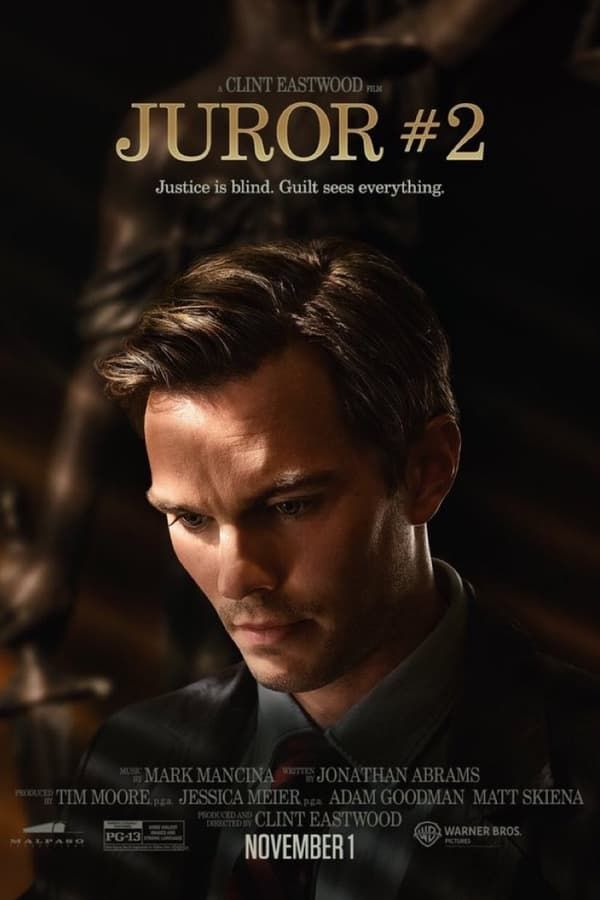There have been some conflicting reports regarding the release strategy for Juror #2, Clint Eastwood’s latest and possibly last film as a director. The movie was made for the Max streaming service, but word on the street is that Warner Bros. pivoted to a theatrical release following positive test screenings. When it was revealed that the film would only be given a limited run on 50 screens (it’s currently playing on just 35), some saw it as blatant disrespect to Eastwood, who has worked with the studio for years. As overwhelmingly positive reviews emerged for Juror #2, some thought another pivot might be in store to expand its theatrical release, but it looks like that isn’t going to happen.
Per The Hollywood Reporter, Juror #2 was made for Max due to uncertainty around the performance of adult-skewing dramas at the box office. This was done with Eastwood’s approval and wasn’t a situation where he was blindsided at the last minute. Given the fact that Juror #2 is sporting a 91% on Rotten Tomatoes, making it one of the better-reviewed films of the year, some insiders thought the limited theatrical run would be expanded, but Warner Bros. is standing firm. The studio gave the film a limited run to qualify for awards and the plan is to make the film available on Max over the holiday season, and although an official date has not been revealed, reports indicate it will be released later this month.
While Juror #2 had a budget of less than $35 million, it’s reported that a nationwide theatrical release would’ve cost Warner Bros. millions in marketing – a risk that Warner Bros. wasn’t willing to take, even with Eastwood, as adult dramas have been hit or miss at the box office in the post-pandemic era. The Robert Zemeckis film Here, led by Tom Hanks, was aimed squarely at adults; made on a budget of $45 million, it only managed a $4.8 million opening for Sony Tri-Star over the weekend. Recently, other adult-skewing films like The Apprentice and Jason Reitman’s Saturday Night have also missed at the box office, although it’s not fair to paint all of these films with the same brush.
Studios Are Still Afraid to Bet on Adult-Skewing Films
Movies like Here and Saturday Night appeal to a niche audience of people familiar with the source material or the time period in which the film takes place. Here is based on a 2014 graphic novel by Richard McGuire and uses de-aging technology as its main marketing component, while Saturday Night, despite favorable reviews, depicts a moment in time in 1975 as NBC’s Saturday Night, later rebranded to Saturday Night Live, is set to premiere. These films are all very specific and, in many ways, limit their audience. Sometimes films financially bomb because they aren’t good, and others are derailed because the subject only speaks to a certain pocket of the audience. In the case of The Apprentice, no matter how good Sebastian Stan is in that film, there is enough Donald Trump on our TV screens for free that it makes it silly to want to pay to see a version of his life on the big screen.
Related
Juror #2 Review: Clint Eastwood is Guilty of Directing One of the Year’s Most Satisfying Films
The 94-year-old icon explores America’s flawed legal system in a courtroom drama starring Nicholas Hoult and Toni Collette.
Juror #2 sets itself apart by telling a story that is more universal with a legal thriller angle that’s more appealing to a mass audience. Then there is Eastwood himself. It’s easy to point to the lackluster performance of his last film, Cry Macho, released day-and-date in theaters and on Max, then known as HBO Max. Sure, it only grossed $16 million against its $33 million budget, but it was released at an unusual time, as movie theaters scrambled to return to pre-pandemic normalcy.
Eastwood is remarkably reliable when it comes to older audiences flocking to his movies. Instead of looking at his misses (Richard Jewell’s $44 million global gross is also being cited as a concern for Warner Bros.), start paying attention to his wins, which are massive when you look at Gran Torino ($270 million worldwide on a $33 million budget), American Sniper ($547 million worldwide on a $59 million budget), Sully ($240.8 million on a $60 million budget), and The Mule ($174.8 million worldwide on a $50 million budget). With a track record like that – to say nothing of the fact that he consistently finishes productions on time and under-budget – you take a chance on Eastwood.
Juror #2 was released overseas theatrically in eight markets where it has already made $5 million in France alone. Maybe the studio knows something the masses don’t, but some might be willing to bet that this film would’ve done decent business with a full theatrical release and would’ve likely made up its lower-end budget, even with marketing spend. The film will no doubt thrive on Max, where the target demo will also flock to it, but it’s hard to think that money isn’t being left on the table here. With a pedigree as good as Eastwood’s, stellar reviews, and solid word of mouth from those who have seen it, Juror #2 could’ve been a theatrical hit for the director and an amazing showing for what could be his last film as a director.

Justin Kemp, a juror in a prominent murder trial, encounters a moral conflict as he realizes his influence over the jury’s decision. Struggling with the potential consequences, he faces the ethical challenge of possibly swaying the verdict to either convict or free the wrong individual, complicating his role significantly.


